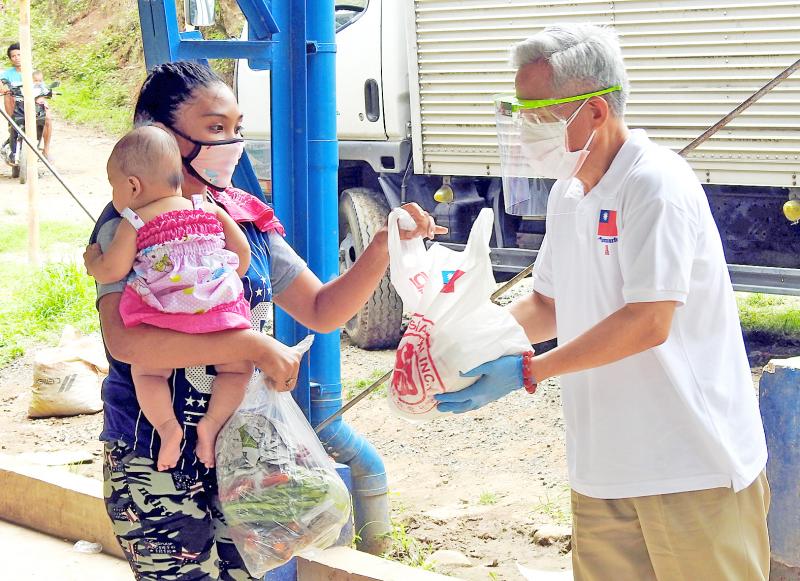Taiwan had as of the end of last month donated about 10,980 tonnes of white rice to countries suffering from food shortages amid the COVID-19 pandemic.
Prices of white rice around the world have fluctuated greatly, as border controls and lockdown measures implemented by nations to curb the spread of the virus have affected the global food supply chain, Agriculture and Food Agency Deputy Director-General Juang Lao-dar (莊老達) said on Tuesday.
With a sufficient national grain reserve, Taiwan plans to donate a total of 36,410 tonnes of white rice to 16 nations this year, including its diplomatic allies Haiti, Honduras, Nicaragua and Eswatini, as well as African countries affected by food shortages, Juang said.

Photo: CNA
The donations are part of Taiwan’s international humanitarian efforts, which have been ongoing for 18 years, to help nations suffering from grain shortages due to poverty, hunger or major disasters, he said.
The agency — which collaborates with the Ministry of Foreign Affairs, and non-governmental organizations such as the Buddhist Compassion Relief Tzu Chi Foundation — has helped more than 40 countries in Africa, Central and South America, Asia and Oceania with grain donations, he said, adding that the amount of white rice donated totals about 400,000 tonnes.
The donations were made after ensuring that they would not disrupt domestic supplies or the international trade order, he added.
Honduras has been highlighted in the government’s grain donation efforts, as it had suffered a drought-induced food shortage before a wide range of economic activities came to a halt amid the COVID-19 outbreak, Juang said, adding that the rice donations were a timely relief for the nation.
“Seeing white rice bags printed with ‘Taiwan Can Help’ being loaded into containers brings us an indescribable sense of joy,” said an anonymous staff member of the grain-processing operator that works with the government on humanitarian aid.
It has been an honor to assist with the international donations, as it not only helps those in need, but also raises the global profile of Taiwanese rice, they added.

A preclearance service to facilitate entry for people traveling to select airports in Japan would be available from Thursday next week to Feb. 25 at Taiwan Taoyuan International Airport, Taoyuan International Airport Corp (TIAC) said on Tuesday. The service was first made available to Taiwanese travelers throughout the winter vacation of 2024 and during the Lunar New Year holiday. In addition to flights to the Japanese cities of Hakodate, Asahikawa, Akita, Sendai, Niigata, Okayama, Takamatsu, Kumamoto and Kagoshima, the service would be available to travelers to Kobe and Oita. The service can be accessed by passengers of 15 flight routes operated by

Alain Robert, known as the "French Spider-Man," praised Alex Honnold as exceptionally well-prepared after the US climber completed a free solo ascent of Taipei 101 yesterday. Robert said Honnold's ascent of the 508m-tall skyscraper in just more than one-and-a-half hours without using safety ropes or equipment was a remarkable achievement. "This is my life," he said in an interview conducted in French, adding that he liked the feeling of being "on the edge of danger." The 63-year-old Frenchman climbed Taipei 101 using ropes in December 2004, taking about four hours to reach the top. On a one-to-10 scale of difficulty, Robert said Taipei 101

MORE FALL: An investigation into one of Xi’s key cronies, part of a broader ‘anti-corruption’ drive, indicates that he might have a deep distrust in the military, an expert said China’s latest military purge underscores systemic risks in its shift from collective leadership to sole rule under Chinese President Xi Jinping (習近平), and could disrupt its chain of command and military capabilities, a national security official said yesterday. If decisionmaking within the Chinese Communist Party has become “irrational” under one-man rule, the Taiwan Strait and the regional situation must be approached with extreme caution, given unforeseen risks, they added. The anonymous official made the remarks as China’s Central Military Commission Vice Chairman Zhang Youxia (張又俠) and Joint Staff Department Chief of Staff Liu Zhenli (劉振立) were reportedly being investigated for suspected “serious

Taiwanese and US defense groups are collaborating to introduce deployable, semi-autonomous manufacturing systems for drones and components in a boost to the nation’s supply chain resilience. Taiwan’s G-Tech Optroelectronics Corp subsidiary GTOC and the US’ Aerkomm Inc on Friday announced an agreement with fellow US-based Firestorm Lab to adopt the latter’s xCell, a technology featuring 3D printers fitted in 6.1m container units. The systems enable aerial platforms and parts to be produced in high volumes from dispersed nodes capable of rapid redeployment, to minimize the risk of enemy strikes and to meet field requirements, they said. Firestorm chief technology officer Ian Muceus said